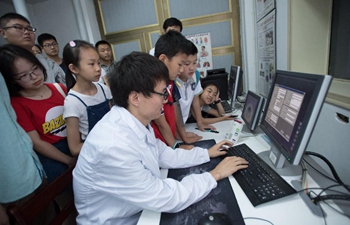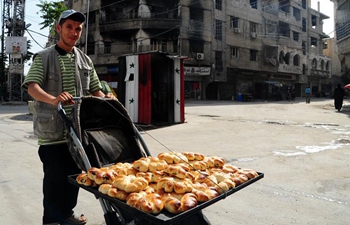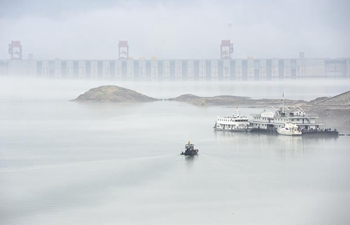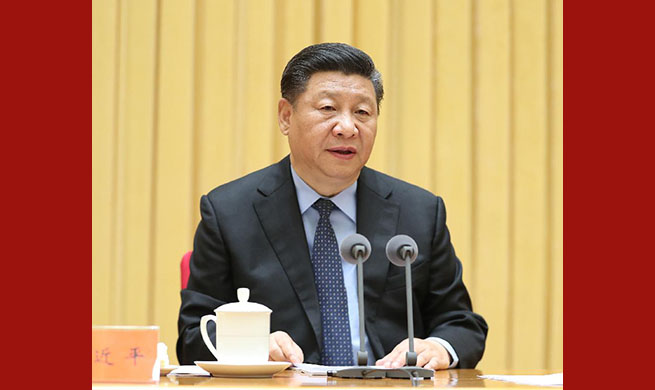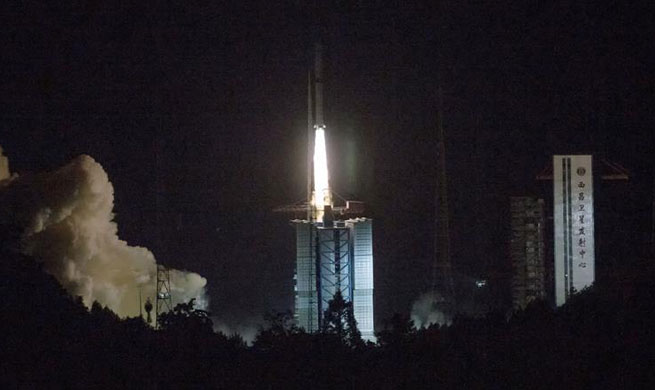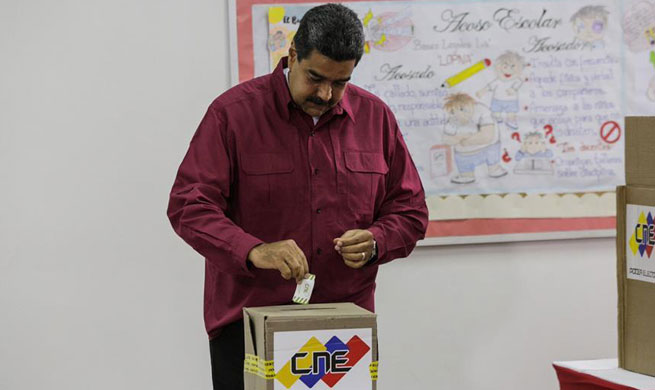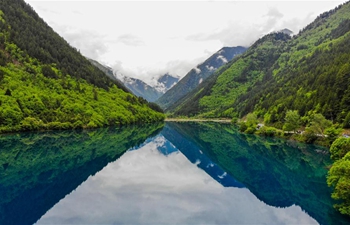TEHRAN, May 20 (Xinhua) -- Political sympathy from Europe with Iran's nuclear deal is "not enough" and they should take more "practical steps" to guarantee Iran's economic interests from the deal, Iranian Foreign Minister Mohammad Javad Zarif said here on Sunday.
"With the exit of the United States from the nuclear agreement, expectations from the the European Union (EU) to preserve the achievements of the deal are high," Zarif made the remarks in a meeting with the visiting EU's Energy Chief Miguel Arias Canete.
"Under the current circumstances, political support of Europe to the nuke deal is not sufficient," Zarif said.
"EU should take further practical steps to continue economic cooperation with Iran," he said, adding that "EU should boost investments in Iran."
He expressed doubt that Europe's commitment to implementing the deal, known as Joint Comprehensive Plan of Action (JCPOA), is in contradiction with the withdrawal of major European companies from Iran's projects after the United States pulled out.
For his part, Canete said that following the U.S. exit from the deal, Europeans have unified to save the JCPOA.
The political resolve of the EU is to implement the JCPOA and to continue the cooperation between European companies and the Islamic republic, he said.
The U.S. exit from the deal has caused problems to Europe, however, the EU's message is to protect the accord and its implementation, he added.
Earlier in the day, first Vice Speaker of the Iranian Parliament Ali Motahhari said that Iranian government is satisfied with the recent talks with its European partners over preserving the nuclear deal and securing Iran's interests.
Iran's foreign minister and his negotiation team expressed their satisfaction on Sunday, but said that "everything depends on the results of the talks in the next weeks," Motahhari was quoted as saying by official IRNA news agency.
Motahhari made the remarks on the sidelines of a parliament meeting, where Zarif briefed the lawmakers on the ongoing talks with France, Germany, Britain and the EU Foreign Policy Chief Federica Mogherini over the fate of the nuclear deal after U.S. withdrawal from it.
"The steps that the Europeans have taken in this regard so far are acceptable," he added.
On Saturday, Head of the Atomic Energy Organization of Iran (AEOI) Ali Akbar Salehi urged the European countries to remain committed to their promises in the Iranian 2015 nuclear deal.
Salehi expressed hope that the EU fulfill its pledges to secure Iran's interests, which were made in the recent meetings with the Iranian delegation in Brussels.
Salehi made the remarks in the joint press conference with the visiting EU's energy chief.
The EU's efforts to save the nuclear contract show that the deal is a very important agreement for the region and the world, Salehi said.
However, if the Europeans fail to undertake their obligations, Iran has to press ahead with its peaceful nuclear development with full determination, he said.
The Iranian official noted that the EU and the Iranian authorities have also discussed to replace U.S. dollar with euro in their trade transactions, and that the EU has taken initial steps in this regard.
The U.S. pullout from the Iranian nuclear agreement, once more, proved to the world that Washington is not reliable in undertaking its international responsibilities, said Salehi.
U.S. exit from the deal may cause some problems, but it will not cause serious ones, he stressed.
Also, Canete stressed that preserving the nuclear deal is of significance to global and regional peace.
EU has sent a message to the Iranian friends that as long as they stick to the agreement, the Europeans will remain committed to it, Canete said, adding that the EU bloc hopes to boost trade with Iran.
Besides, Iran's Petroleum Minister Bijan Namdar Zanganeh said on Saturday that Iran's oil exports will not be affected if the EU refrains from following the United States in imposing new economic pressures on the Islamic republic.
"The U.S. decision to withdraw from the nuclear deal would not affect Iran's oil exports if EU could salvage the deal," Zanganeh told reporters after his meeting with Canete.
The Iranian minister called for OPEC member states to remain united in their upcoming decision to secure members' interests and market stability.
U.S. President Donald Trump decided on May 8 to quit Iran's nuclear deal and vowed to re-impose sanctions, including oil embargo, on Tehran.
Canete said Saturday that "we will have to ask for (sanction) waivers, for carve-outs for the (European) companies that make investments."
Besides, Salehi said that he discussed reapplying European law of "the blocking statute" with Canete on Saturday.
Iran pushes the EU for the revival of "the blocking statute" which is a 1996 regulation that prohibits EU companies and courts from complying with foreign sanctions laws and stipulates that no foreign court judgments based on these laws have any effect in the EU.
Canete arrived in Tehran on Friday for a two-day visit to reassure Iran that the EU wants to keep open trade and cooperation with Iran despite the U.S. decision to pull out.





